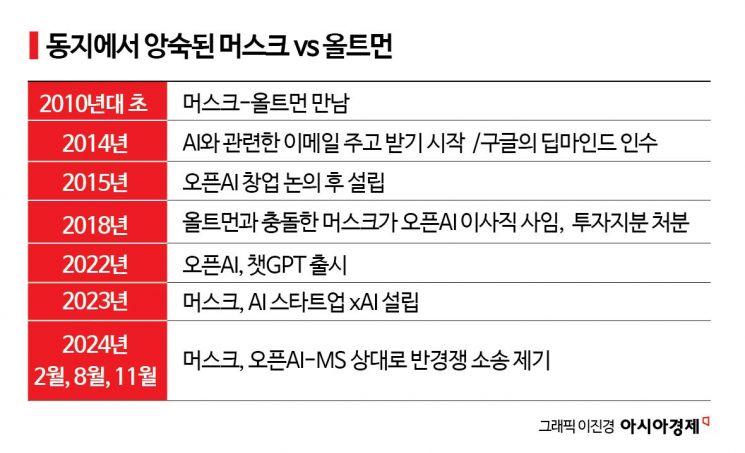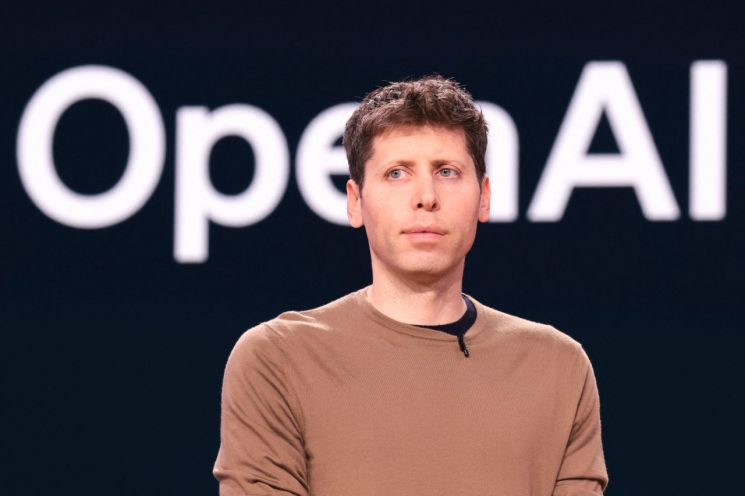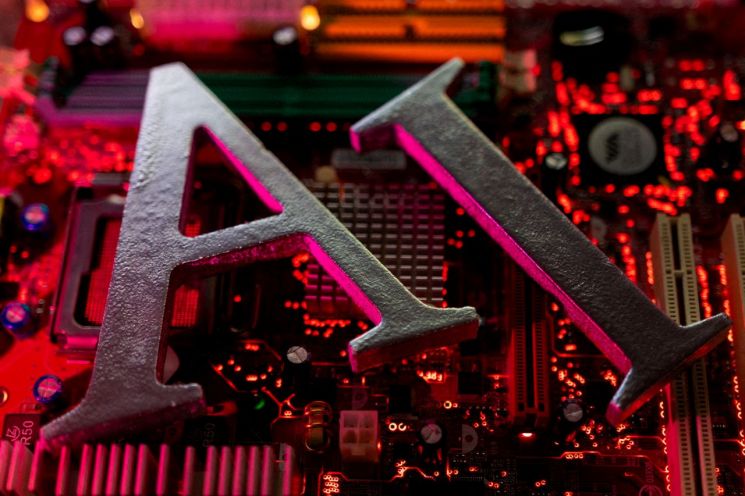⑥ ‘Trump’s closest aide’ Musk, likely to be involved in AI policy ↑
Enemy with OpenAI CEO Altman… Litigation in progress
Regulation or relaxation…AI regulatory policy is also at a crossroads
Private investment will likely be emphasized considering the AI companies in operation.
“I’ve been thinking a lot about whether we can stop humanity’s development of artificial intelligence (AI). If it’s going to happen anyway, it would be better for someone other than Google to do it first.”
Tesla CEO Elon Musk received an email in 2015. This was a message sent by Sam Altman, now the ‘father of ChatGPT’ and then president of Y Combinator, a Silicon Valley accelerator, while preparing to start an Open AI startup. In 2014, when Google acquired AI company DeepMind and predicted that it would monopolize general artificial intelligence (AGI) technology with human-like intelligence, the two people, who felt anxious, decided to collaborate. We established a non-profit organization with the goal of ‘democratizing the benefits of advanced AI’ and added ‘open’, a word that emphasizes transparency, to the company name. The company that was born that way is Open AI.
Tesla CEO Elon Musk (right in photo) and U.S. President-elect Donald Trump Reuters Yonhap News
View original icon
However, nine years later, CEO Musk filed three lawsuits against OpenAI CEO Altman in February, August, and November. CEO Musk claimed that OpenAI and Microsoft (MS) are in fact pursuing a merger and that they are “monopolizing the market.” The two clashed while collaborating in the process of growing Open AI, and are now completely separated.
The whole world is showing interest in the reunion of two people who are representative ‘enemies’ in the AI industry. This is because speculation is pouring in that CEO Musk, who was appointed as head of the Department of Government Efficiency (DOGE), will exert tremendous influence on the U.S. government’s AI policy in the future. CEO Altman is the CEO of OpenAI, a leader in generative AI technology, and CEO Musk is the world’s richest man and a key figure in the second term of Donald Trump’s administration, raising the possibility that they will clash once again.
The impact that the conflict between the two will have on the AI market in the future and the possibility of CEO Musk, an ‘entrepreneur’ running xAI, getting involved in AI policy act as variables that could cause a change in the direction of AI policy in Trump’s second term.
Variable ① “De facto merger”: After Trump was elected, the complaint was filed again in court.
The global generative AI market is currently led by private companies. The structure is such that companies focus on developing AI technology by investing large amounts of capital, and governments in each country impose regulations in the name of ‘safety measures’. As ChatGPT gained explosive popularity in November 2022, the U.S. company OpenAI and its partner Microsoft (MS) established themselves as leaders in the AI market. Other big American tech companies, such as Google, are also challenging the company as competitors.
The lawsuit filed by CEO Musk against CEO Altman and others arose against this background. In the lawsuit first filed in February, CEO Musk said that when Open AI was founded in 2015, CEO Altman and other founders promised to develop AI technology for the benefit of humanity as a non-profit organization, but later violated the contract by pursuing profit contrary to their promise. insisted. It is claimed that CEO Altman deceived him by donating over $40 million (about 55.7 billion won) based on his promise. Open AI reminded CEO Musk of the process of repeatedly filing and withdrawing a lawsuit in less than a year and countered, saying, “Musk is trying to reconstruct his claims, but there is no basis.”

View original icon

View original icon
CEO Musk’s series of lawsuits are interpreted as an attempt to shake the hegemony of Open AI, which is monopolizing the market. The fact that the complaint was filed again after Trump was elected in February and August last year raises the possibility that CEO Musk will attempt to reorganize the market with the help of Trump’s power. The Wall Street Journal (WSJ) noted that it is noteworthy that CEO Musk has emerged as President-elect Trump’s closest aide and has escalated the legal battle against OpenAI and Microsoft. Sarah Krebs, director of the Cornell Technology Policy Institute, predicted in an interview with Yahoo Finance, “CEO Musk’s role and influence in the second Trump administration will significantly complicate this lawsuit.”
Variable ② Trump and Republicans “Let’s loosen regulations”… Musk has emphasized safety
The AI industry is paying attention to what kind of AI regulatory policy direction CEO Musk’s actions will take in the Trump 2.0 era. So far, government-level AI regulations have emerged as a response to various negative effects occurring while private companies focus on technology development. The U.S. Joe Biden administration also created an executive order in October last year containing various measures, including creating an agency to test and evaluate AI models before they are released and establishing security and privacy protection guidelines. In August of this year, an AI regulation bill that strengthened pre- and post-regulation of AI companies was passed by the state legislature in California, although it was stranded due to the governor’s veto.
CEO Musk is one of the leading AI regulators who argues that some regulation related to the use of AI is necessary. In March of last year, when ChatGPT was a sensation, Apple co-founder Steve Wozniak and Hebrew University professor Yuval Harari, a best-selling author, and more than 1,000 world famous people wrote a joint letter considering the risks of AI, saying, “Let’s stop technology development for six months.” I have posted it before. He also expressed his support for a bill recently proposed in California.

Sam Altman, CEO of OpenAI AFP Yonhap News
View original icon
The problem is that President-elect Trump and the Republican Party have different positions from CEO Musk. During the presidential campaign, President-elect Trump announced his intention to repeal the Biden administration’s AI executive order upon taking office. This is because the measure not only hinders innovation but also prevents the United States from solidifying its hegemony in the AI market. The Republican Party and supporters of President-elect Trump are also voicing that various regulations related to AI should be eliminated. Gregory Allen, director of the Wadhwani AI Center at the Center for Strategic and International Studies (CSIS), analyzed to Bloomberg News that “in some right-wing policy circles, security and censorship are considered synonymous.”
Andrew Strait of the Ada Lovelace Institute, a private research firm that studies the responsible use of AI, told CNN, “It is still too early to be sure whether the Trump administration will strengthen or roll back regulations,” adding that CEO Musk will be waiting for President-elect Trump to decide on the direction of future AI regulations. He explained that there is a possibility that this may reflect a situation where people are concerned about the risks of AI.
Variable ③ Musk is also an entrepreneur who runs xAI
However, given that CEO Musk, who emphasizes the risks of AI, is also a businessman who runs xAI, an AI company, we cannot rule out the possibility that his thoughts on AI regulation will change in the future. CEO Musk has shown a strong tendency to avoid laws and regulations while running several companies, including Tesla, SpaceX, and Considering these characteristics, it is unlikely that he will advocate blocking the overall development of AI technology during the second Trump administration. Focus is on the idea that some regulations will be put in place to prevent harm caused by AI, but private investment will be necessary.

Reuters Yonhap News
View original icon
Even from the perspective of the second Trump administration, it is not easy to create policies to unconditionally regulate big tech companies, including AI leaders OpenAI and Microsoft. Moreover, President-elect Trump has placed AI technology as a national security priority.
Meanwhile, it has been reported that President-elect Trump is recently considering appointing a person in charge of coordinating federal policies and government use of AI at the White House. Axios, a U.S. internet media outlet, said that President-elect Trump is considering appointing an ‘AI czar’ (an unofficial title for a high-ranking government official in the United States and elsewhere), and although CEO Musk will not sit in this position, he could have a significant influence on the selection. It was reported that
Foreign media raise the possibility that Vice President-elect JD Vance, who has shown skepticism about AI regulation, will lead AI policy. He pointed out that the Biden-style executive order strengthens the industrial dominance of large AI companies and suppresses small startups. Axios predicted, “CEO Musk has conflicting personas regarding AI regulation, and it is unknown which direction he will whisper in Trump’s ear,” adding, “It will emerge as a realistic dilemma after the inauguration ceremony on January 20th next year.” did it
Reporter Jeong Hyun-jin jhj48@asiae.co.kr
<ⓒ투자가를 위한 경제콘텐츠 플랫폼, 아시아경제(www.asiae.co.kr) 무단전재 배포금지>
Source: www.asiae.co.kr


